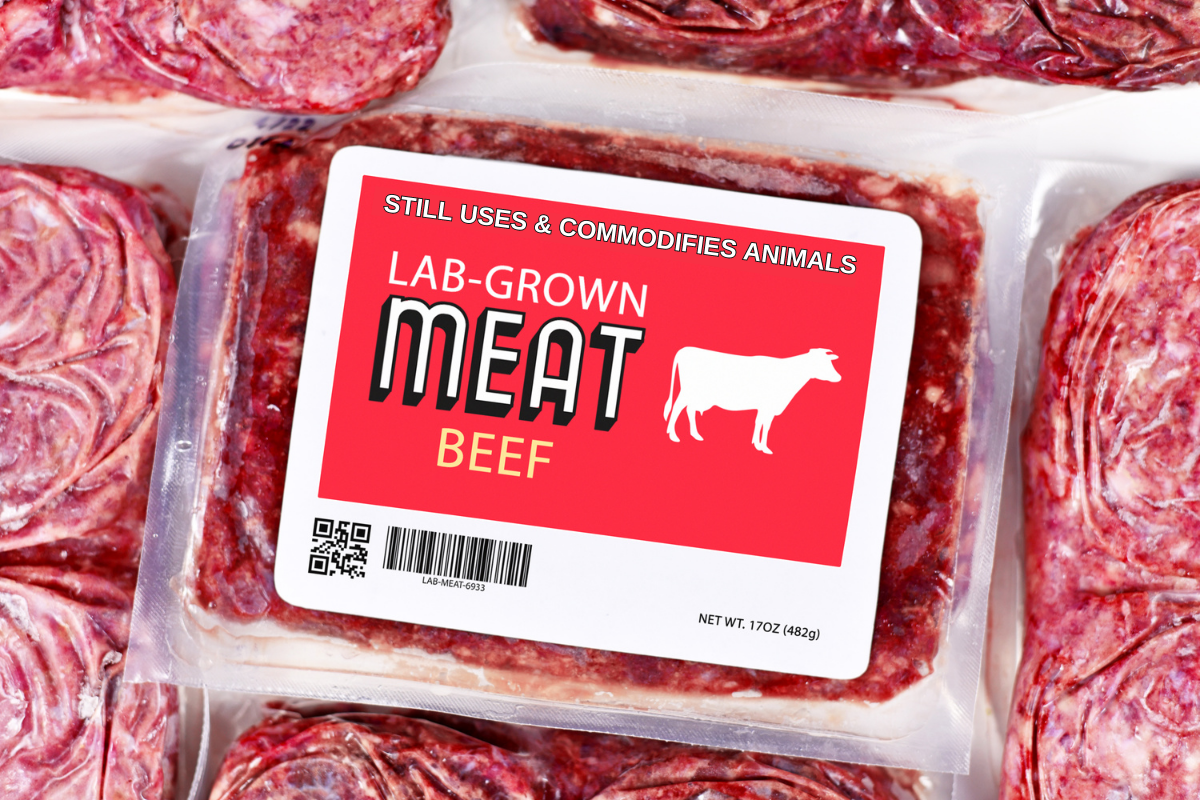There’s a lot of buzz about lab-grown “meat” technology. It involves taking stem cells from an animal to grow inside bioreactors, where cells are fooled into believing they are still inside an animal’s body because they are fed a mixture of nutrients such as amino acids, vitamins, sugars and minerals.
Though these biopsies are invasive, supporters argue the process is less painful than many of the procedures an animal might endure during its lifetime on a farm, and the process does not involve the animal being killed.
However, Gary L. Francione, philosopher at Rutgers University and author of the 2020 work Why Veganism Matters: The Moral Value of Animals, said of lab-grown meat that “if an animal was used, it is not vegan.” Period.
We couldn’t agree more.
Eating “clean meat” will not eliminate harm to animals; eating plants will, in addition to improving individual health.
Flesh produced by lab workers doesn’t offer a better future for animals or the environment. As of right now, all lab-grown meat still uses and commodifies animals — whether it’s foie gras grown from avian starter cells that are taken from a muscle-biopsy procedure or a “clean” hamburger using bovine starter cells, a byproduct from blood of cow fetuses extracted during the slaughtering process.
Find out the truth about lab-grown meat in this Q&A between Friends of Animals President Priscilla Feral and Francione.
As you know, on Nov. 21, 2022, the U.S. Food and Drug Administration decided that lab-grown meat made by culturing animal cells is safe to eat. The FDA gave the green light to California-based Upside Foods “chicken,” putting it one step closer to grocery store shelves and restaurants. What’s your reaction to this development?
I am absolutely opposed to any animal use. There is no sort of animal use that I will praise or support. I am not a utilitarian (or consequentialist of any sort) where fundamental rights are involved. So the “but it will reduce the killing of animals” arguments don’t resonate with me. And by the way, I do not think for a second cultured meat will reduce animal use in any significant way. The large agricultural corporations that produce meat know that world population is increasing, and we are running out of space to expand conventional meat production. Cultured meat will supplement a market that I do not think will be substantially reduced and certainly not eliminated. That is, cultured meat is just going to become part of the meat industry. That is why some of those large meat companies are investing in cultured meat.
Dr. Uma Valeti, the CEO of Upside Foods, said that he’s “thrilled that U.S. consumers will soon have the chance to eat delicious meat that’s grown directly from animal cells.” What’s your response?
Valeti is the CEO of a corporation that develops and makes cultured meat. Of course he’s thrilled.
Will lab-grown meat spare animals from being bred into existence on animal farms, reducing their misery and greenhouse gas emissions?
There is no indication whatsoever that cultured meat is going to replace meat to any significant degree. I think that there is every indication that it will do little more than supplement the existing supply of meat.
Bruce Friedrich, who founded The Good Food Institute, says he’s long been focused on creating a clean alternative to animal agriculture that competes on taste, price and convenience. He also said a “clean meat” industry would be an alternative to the current objectionable animal farming practices. Do you agree?
I think that we need to shift the paradigm away from animal bodies as food. It makes no sense to me that “animal people” are perpetuating the notion that animals from any source or however produced are food. That is what needs to change. I wish “animal people” would put their time, energy and money into really promoting veganism as a moral imperative and as a major contributor to improved human health and environmental integrity, rather than trying to make money off perpetuating any sort of animal use. That is the same thinking that has fueled the animal welfare movement—a bunch of corporate charities that bring in millions selling “happy” exploitation. That has been a disaster. Why don’t “animal people” stop trying to make a living by promoting anthropocentric and speciesist thinking and behavior?
Gary L. Francione is Board of Governors Distinguished Professor of Law and Katzenbach Scholar of Law and Philosophy at Rutgers University School of Law (USA). He has written numerous books, articles, and essays on animal rights, the property status of animals, the problems with animal welfare reform campaigns and single issue campaigns, and veganism as a moral imperative. His most recent book is Why Veganism Matters: The Moral Value of Animals, published in 2020 by Columbia University Press. With his colleague and partner, Anna Charlton, he started the Rutgers Animal Rights Law Clinic in 1990, which was the first of its kind anywhere.

